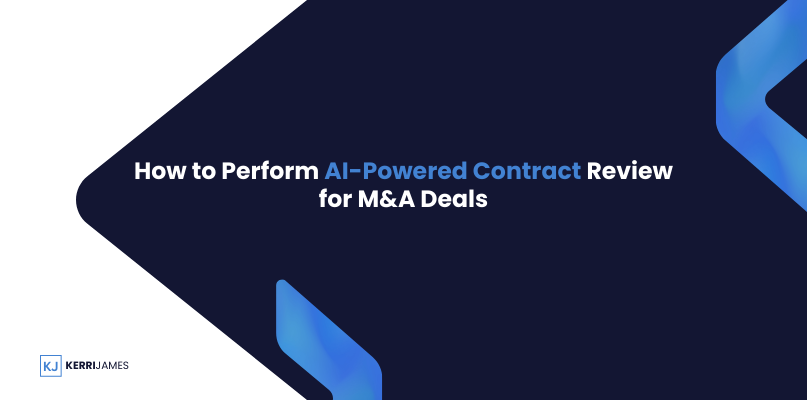Imagine you’re in the middle of a high-stakes M&A deal, where every detail counts, and the pressure is immense. Now picture sifting through stacks of contracts, trying to catch every potential risk, every key clause—it’s daunting, isn’t it? The traditional contract review process has always been a critical but labor-intensive part of M&A transactions. However, with the advent of AI-powered contract review, this tedious task is being revolutionized. In this blog post, we’ll explore how AI is transforming contract review in M&A deals, providing a faster, more accurate, and cost-effective solution.
The Importance of Contract Review in M&A Deals
Overview of M&A Deals
Mergers and Acquisitions (M&A) are complex transactions that involve the consolidation of companies or assets. Whether it’s a merger of two giants in the industry or an acquisition of a smaller firm to bolster a company’s capabilities, M&A deals are integral to corporate strategy and growth. However, these deals come with their own set of challenges, particularly in ensuring that all legal documents, such as contracts, are thoroughly reviewed and understood.
Critical Role of Contract Review
Contract review in M&A is not just a formality; it’s a safeguard against potential pitfalls. Contracts dictate the terms of the deal, outline obligations, and protect against risks. They are the backbone of any M&A transaction. Ensuring that these contracts are meticulously reviewed is essential for:
- Identifying Risks: Every clause in a contract could harbor potential risks—be it financial, operational, or legal. Missed clauses can lead to significant liabilities post-deal.
- Ensuring Compliance: Legal compliance is crucial in M&A. Contracts need to be reviewed to ensure they meet all legal and regulatory requirements.
- Protecting Interests: A thorough review ensures that the interests of all parties involved are adequately protected, minimizing the chance of disputes down the line.
Challenges of Traditional Contract Review
Despite its importance, traditional contract review is fraught with challenges:
- Time-Consuming: Reviewing hundreds or even thousands of contracts manually is a time-intensive process, often leading to delays in the deal.
- Prone to Human Error: The sheer volume of documents increases the likelihood of human error, with important details potentially being overlooked.
- High Costs: Engaging legal teams to manually review contracts is expensive, particularly when dealing with high volumes.
These challenges have driven the legal industry to explore more efficient solutions, leading to the rise of AI-powered contract review.
Introduction to AI-Powered Contract Review
What is AI-Powered Contract Review?
AI-powered contract review is a technological solution that leverages artificial intelligence to analyze contracts more quickly and accurately than traditional methods. By using AI algorithms, particularly those based on Natural Language Processing (NLP) and machine learning, this technology can review, analyze, and extract key information from contracts at a scale and speed that would be impossible for humans.
Key Technologies Involved
- Natural Language Processing (NLP): NLP allows AI to understand and interpret the human language found in contracts. It can recognize legal terminology, clauses, and context, making it ideal for analyzing complex legal documents.
- Machine Learning: Machine learning enables the AI to improve its contract analysis capabilities over time. As it processes more contracts, it becomes better at identifying patterns, risks, and anomalies.
- Optical Character Recognition (OCR): For contracts that are scanned documents rather than digital text, OCR technology is used to convert images of text into machine-readable data.
How AI Transforms Contract Review
AI-powered contract review transforms the traditional process in several ways:
- Efficiency: AI can analyze hundreds of contracts in the time it would take a human team to review just a few. This speed is invaluable in the fast-paced world of M&A.
- Accuracy: AI reduces the risk of human error by consistently applying the same rules and checks across all documents.
- Comprehensive Analysis: AI can identify and flag unusual clauses, missing information, or inconsistent language, ensuring that nothing is overlooked.
Benefits of AI-Powered Contract Review for M&A
Speed and Efficiency
One of the most significant benefits of AI-powered contract review is its ability to process contracts at an unprecedented speed. In M&A deals, where time is often of the essence, this capability is a game-changer. AI can swiftly sift through large volumes of contracts, identifying key clauses and potential issues in a fraction of the time it would take a human team. This not only speeds up the due diligence process but also allows legal teams to focus on more strategic aspects of the deal.
Accuracy and Consistency
AI excels at consistency. Unlike human reviewers, who may interpret contract language differently or miss critical details after hours of work, AI applies the same analytical standards to every document. This consistency ensures that key clauses, such as indemnity, liability, and termination clauses, are thoroughly reviewed and that any anomalies are promptly flagged. This heightened accuracy reduces the risk of costly mistakes that could arise from overlooked contract terms.
Cost-Effectiveness
While the initial investment in AI-powered tools may seem high, the long-term savings are substantial. By reducing the time and manpower required for contract review, AI lowers the overall cost of M&A transactions. Additionally, by minimizing the risk of human error, AI reduces the potential for post-deal litigation or renegotiations, which can be extremely costly.
Scalability
M&A deals often involve a massive number of contracts, particularly in large-scale transactions. AI-powered contract review is inherently scalable, capable of handling everything from a few dozen to thousands of contracts with ease. This scalability ensures that no matter the size of the deal, the contract review process remains efficient and manageable.
How to Implement AI-Powered Contract Review in M&A Deals
Selecting the Right AI Tool
Choosing the right AI-powered contract review tool is crucial for a successful implementation. Here are some key factors to consider:
- Accuracy: The tool should have a high degree of accuracy in identifying and interpreting contract clauses. Look for tools that are well-reviewed and have a proven track record in the industry.
- Ease of Use: The tool should be user-friendly, with an intuitive interface that allows legal teams to quickly get up to speed.
- Integration Capabilities: The tool should easily integrate with existing systems, such as contract management software or legal databases.
- Customer Support: Ensure that the tool provider offers robust customer support, including training and troubleshooting services.
Integration with Existing Systems
For AI-powered contract review to be effective, it must integrate seamlessly with your existing legal and business systems. This integration allows for a more streamlined workflow, where contracts can be uploaded, reviewed, and stored within the same system. Additionally, integrating AI tools with existing contract management systems ensures that all relevant data is accessible and actionable.
Training and Onboarding
While AI-powered tools are designed to simplify the contract review process, effective implementation still requires training. Legal teams need to understand how to use the tool, interpret its outputs, and address any issues that arise. Training should focus not only on the technical aspects of the tool but also on how to integrate AI-generated insights into the broader M&A process.
Monitoring and Continuous Improvement
AI tools, like any technology, require monitoring to ensure they are performing as expected. Regularly reviewing the AI’s outputs, gathering feedback from users, and making adjustments as needed are critical to maintaining accuracy and efficiency. Continuous improvement is key—both in refining the AI’s performance and in ensuring that your legal team remains proficient in its use.
Case Studies and Real-World Applications
*the names of the firms are anonymized
Case Study 1: Global Tech Merger
In a recent high-profile merger between two global tech companies, AI-powered contract review played a pivotal role. The legal teams involved were faced with the daunting task of reviewing over 10,000 contracts in a limited timeframe. By deploying an AI-powered solution, they were able to complete the review process in just a few weeks, identifying critical risks and ensuring compliance across all documents. The AI tool flagged several high-risk clauses that had been overlooked during initial manual reviews, allowing the teams to renegotiate terms and secure a better deal.
Case Study 2: Mid-Market Acquisition
In another instance, a mid-market company used AI-powered contract review during the acquisition of a competitor. The acquisition involved a smaller number of contracts—around 500—but each was complex and filled with nuanced legal language. The AI tool used was particularly effective in identifying ambiguous terms and ensuring that all contracts aligned with the company’s risk tolerance. As a result, the deal closed smoothly, with all parties satisfied with the outcomes.
Lessons Learned
From these case studies, several key lessons emerge:
- Speed is crucial: AI can dramatically reduce the time required for contract review, which is vital in fast-paced M&A deals.
- Accuracy matters: AI’s ability to consistently apply analysis across all documents can catch issues that might otherwise be missed.
- Human oversight is still necessary: While AI is powerful, human expertise is essential in interpreting the AI’s findings and making final decisions.
Challenges and Considerations
Limitations of AI in Contract Review
While AI offers many advantages, it’s not without its limitations. One of the primary concerns is that AI, despite its sophistication, can struggle with nuanced legal language and context. For instance, a clause that appears standard on the surface may have different implications depending on the specific deal. This is where human oversight remains essential—AI can identify potential issues, but legal professionals must make the final call.
Data Security Concerns
M&A transactions involve sensitive information, and using AI tools introduces new data security challenges. It’s crucial to ensure that the AI tools used for contract review comply with strict data security protocols. This includes encryption, secure access controls, and regular audits to prevent unauthorized access to sensitive information.
Ethical Considerations
The increasing use of AI in legal processes also raises ethical concerns. For example, there’s the potential for AI algorithms to perpetuate biases, particularly if they are trained on biased data sets. Additionally, the reliance on AI might lead to a devaluation of human legal expertise, particularly for junior lawyers who traditionally gain experience through tasks like contract review.
The Future of AI in M&A
Evolving AI Capabilities
AI technology is constantly evolving, and its role in M&A is likely to expand. Future developments in AI could include more advanced NLP capabilities, allowing for even more precise contract analysis. Additionally, AI may begin to offer predictive insights, helping legal teams anticipate issues before they arise.
Potential for Full Automation
As AI technology continues to advance, there is potential for full automation of the contract review process. However, this raises questions about the future role of legal professionals in M&A. While AI may handle the bulk of the review process, human oversight will remain crucial, particularly in interpreting complex or ambiguous contract language.
The Role of Human Expertise
Even as AI takes on more of the contract review process, human expertise will continue to play a vital role. Legal professionals bring a depth of understanding and judgment that AI cannot replicate. The future of M&A will likely see AI and human expertise working together, with AI handling the heavy lifting and legal professionals providing strategic oversight.
Final Words
AI-powered contract review is transforming the M&A landscape, offering speed, accuracy, and cost-effectiveness that traditional methods simply cannot match. By implementing AI tools, M&A teams can streamline the due diligence process, reduce risks, and focus on the strategic elements of the deal. However, it’s important to remember that AI is not a replacement for human expertise—rather, it’s a powerful tool that, when used correctly, can enhance the capabilities of legal professionals.
As AI technology continues to evolve, its role in M&A will likely grow, bringing new possibilities for automation and efficiency. However, the future of contract review will remain a collaboration between cutting-edge technology and skilled legal professionals. For those involved in M&A, now is the time to explore how AI-powered contract review can benefit your deals, ensuring a smoother, more efficient process from start to finish.










